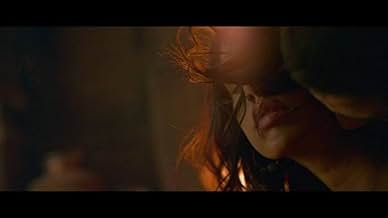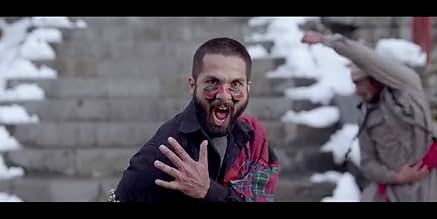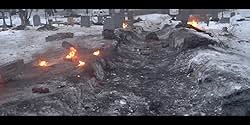Un jeune homme retourne au Cachemire après la disparition de son père pour confronter son oncle, qu'il soupçonne d'avoir joué un rôle dans le destin de son père.Un jeune homme retourne au Cachemire après la disparition de son père pour confronter son oncle, qu'il soupçonne d'avoir joué un rôle dans le destin de son père.Un jeune homme retourne au Cachemire après la disparition de son père pour confronter son oncle, qu'il soupçonne d'avoir joué un rôle dans le destin de son père.
- Prix
- 35 victoires et 47 nominations au total
- Ikhwan Commander
- (as Muzzamil Bhavani)
Histoire
Le saviez-vous
- AnecdotesShahid Kapoor learnt a six-page monologue for the climatic scene where his character ''Haider'' turns mad. He put forth the delivery of that monologue in front of a crowd of 5000 listening. For filming the scene, which was done in 3-4 hours, Shahid Kapoor was made completely bald.
- GaffesThe film is set in 1995, but two superstar Salman Khan fans do impressions of him from his movies released in the 2000s.
- Citations
Haider: Chutzpah Monologue Hello? Hello? Mic testing 1,2,3... Hello...? Awaz aa rahi hai aap laog ko? Hello, hello, hello, hello, hello? UN council resolution no. 47 of 1948, Article 2 of the Geneva convention, and Article 370 of the Indian Constitution. Bas ek sawaal uthata hai, sirf ek. Hum hai, ya ham nahi. Hum hai to kahan hain , aur nahi hain to kahan gaye ? Hum hain to kisliye aur kahan to kab? Janaaaaab... Hum thay bi, ya hum thay hi nahi? CHUTZPAH ho gaya hamare sath! Chutzpah jante hain aap log? aik baar aik bank k andar Dacoity hoi... Dacoit nay cashier k sir pay pistol rakhi or bola paise day warna maut lay! Cashier ne jhat say oota kar saare paise dacoit ko dey diye Dacoit wohi paise lay kar ugle counter per gaya . *Whistles innocently* Excuse me, ek form dijye mujhay account kholna hay... Yeh hota hai CHUTZPAH! CHUTZPAH!
- ConnexionsFeatured in 60th Britannia Filmfare Awards (2015)
- Bandes originalesAao Na
Written by Gulzar
Music by Vishal Bhardwaj
Performed by Vishal Dadlani
Produced by Ketan Sodha
Recorded by Salman Khan Afridi @ Studio Satya, Mumbai
Mixed by Stephen Fitzmaurice For 365 Artists
Mastered by Christian Wright @ Abbey Road Studios, London
By the mid-1990s, Kashmir had taken the form of a like a spewing volcano, a ticking time bomb ready to go kablooey at any given moment. The terrorist insurgency in the Kashmir valley had started to pose a serious threat to India's sovereignty and the army had to be given a carte blanche so as to guard the country against any possible threat from both within and as well as outside the country. The people of Kashmir started seeing the growing military activity in the region as a violation of their basic rights. The separatist leaders saw this as a golden opportunity to galvanize the masses against the state and started adding fuel to fire as the valley got encompassed in a miasma of mistrust. Although, the situation has improved significantly over the last decade, a lot of work still needs to be done before the conflict can be fully resolved. Bhardwaj's film also leaves a strong message not only for people of Kashmir but for all humanity that nothing can be gained through revenge and in the absence of trust.
Adapting a work of Shakespeare is no kid's play. Even the most experienced campaigners can falter if their ambition gets the better of them. The key to adapting any major work of literature is to be wary of one's limitations. Haider is far from being called a perfect adaptation of Hamlet. But, Bhardwaj, to his credit, gets the job done. There are moments of sheer brilliance but there is also a lot of drivel which could have easily been chopped off. Haider has all the makings of an epic but it faces some serious pacing issues towards the second half. Also, the narrative appears to be sketchy at some places. But, that's the price that one must be willing to pay for one's ambition.
One of the main themes of Hamlet is chaos. This chaos is most evident in the play's central character who, in many ways, is a personification of confusion and duality. His highly complex, fascinating albeit bizarre nature makes him a singular character in all literature, endowed with contradictory traits that fade the lines that separate virtue and vice, heroism and villainy, and sanity and madness. In Haider, Vishal Bharadwaj and Shahid Kapoor try their best to grapple with the endless contradictions that define Hamlet's multidimensional character. Oedipus complex is another major theme that runs through Hamlet. The term Oedipus complex denotes the subconscious emotions and ideas that focus upon a child's desire to have sexual relations with the parent of the opposite sex. In Haider the syndrome is both latent and nuanced in comparison to the play.
Haider not only serves as a decent adaptation of Hamlet, but it also proves to be a powerful socio-political commentary on Kashmir of the 1990s. Without the Kashmir angle, Haider would have appeared more empty and existential, with the Shakespearean characters merely playing their parts in a bid to reach the end of the trail. But, with Kashmir as its backdrop, it almost comes across as a propaganda films that aims to serve as a bitter reminder of our not too distant past. Haider is a warning of how easily the youngsters can be brainwashed and led astray by anti-national elements if the state machinery fails to look after them.
While the acting is brilliant all around, it is Tabu who steals the show with a multilayered portrayal that would have guaranteed her an Oscar had Haider been a Hollywood production. Shahid Kapoor's performance in Haider is not perfect but is easily the best of his career, and it comes as no big surprise as Bhardwaj has a reputation to get the best out of his actors. Kay Kay Menon plays his detestable part with the desperation of a mangy scoundrel. Shraddha Kapoor serves well as an eye candy, but, beyond that, not much can be said of her acting. Irrfan Khan is brilliant as ever in the limited screen time that he gets. While the entire support cast does a reasonable job, Narendra Jha, who impresses in the role of Haider's father, deserves a special mention.
Overall, Haider is a dark, distorted and diabolical work of cinematic art that falls well short of attaining perfection. At regular intervals, Bhardwaj tries to lighten up the mood perhaps to satisfy the cravings of the casual viewers. Needless to say, the movie is technically brilliant: cinematography, editing, and music are all at par with the international standards. The movie has several memorable sequences but the ones that stand out are: Shahid Kapoor's monologue, the sequence in which Haider brutally kills his captors, and the final graveyard sequence which may prove to be a real trendsetter as far as Hindi cinema is concerned. Haider is not meant for casual viewers for it will test their patience to the limit. As far as the intelligent viewers are concerned, the movie offers enough food for thought to keep them engaged. Highly recommended!
For more, please visit, A Potpourri of Vestiges.
- murtaza_mma
- 3 oct. 2014
- Lien permanent
Meilleurs choix
- How long is Haider?Propulsé par Alexa
Détails
Box-office
- Budget
- 370 000 000 INR (estimation)
- Brut – États-Unis et Canada
- 1 048 143 $ US
- Fin de semaine d'ouverture – États-Unis et Canada
- 508 084 $ US
- 5 oct. 2014
- Brut – à l'échelle mondiale
- 1 404 307 $ US
- Durée2 heures 40 minutes
- Couleur
- Rapport de forme
- 2.35 : 1
Contribuer à cette page

































